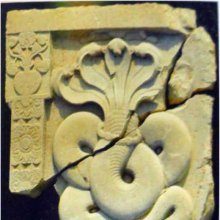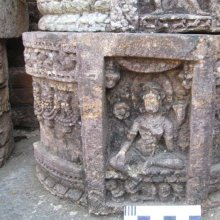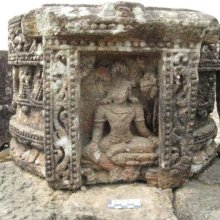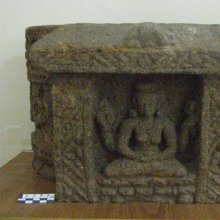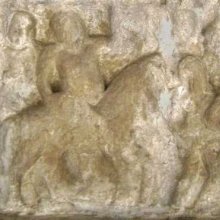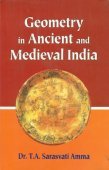Dru, Drū: 12 definitions
Introduction:
Dru means something in Hinduism, Sanskrit, biology. If you want to know the exact meaning, history, etymology or English translation of this term then check out the descriptions on this page. Add your comment or reference to a book if you want to contribute to this summary article.
Images (photo gallery)
(+41 more images available)
In Hinduism
Ayurveda (science of life)
Nighantu (Synonyms and Characteristics of Drugs and technical terms)
Source: Wisdom Library: Raj NighantuDru (द्रु) or Druma refers to a “tree”, as mentioned in a list of twenty-five synonyms in the second chapter (dharaṇyādi-varga) of the 13th-century Raj Nighantu or Rājanighaṇṭu (an Ayurvedic encyclopedia). The Dharaṇyādi-varga covers the lands, soil, mountains, jungles and vegetation’s relations between trees [viz., Dru] and plants and substances, with their various kinds.

Āyurveda (आयुर्वेद, ayurveda) is a branch of Indian science dealing with medicine, herbalism, taxology, anatomy, surgery, alchemy and related topics. Traditional practice of Āyurveda in ancient India dates back to at least the first millenium BC. Literature is commonly written in Sanskrit using various poetic metres.
Biology (plants and animals)
Source: Google Books: CRC World Dictionary (Regional names)Dru in Papua New Guinea is the name of a plant defined with Saccharum officinarum in various botanical sources. This page contains potential references in Ayurveda, modern medicine, and other folk traditions or local practices It has the synonym Saccharum officinarum var. litteratum-breve Hassk. (among others).
Example references for further research on medicinal uses or toxicity (see latin names for full list):
· Flore des Antilles (1808)
· J. Fujian Acad. Agric. Sci. (1996)
· Mémoires de l’Institut Égyptien (1901)
· Species Plantarum (1753)
· Grasses of Burma (1960)
· Flore de la Polynésie Française (1892)
If you are looking for specific details regarding Dru, for example pregnancy safety, extract dosage, health benefits, chemical composition, diet and recipes, side effects, have a look at these references.

This sections includes definitions from the five kingdoms of living things: Animals, Plants, Fungi, Protists and Monera. It will include both the official binomial nomenclature (scientific names usually in Latin) as well as regional spellings and variants.
Languages of India and abroad
Sanskrit dictionary
Source: DDSA: The practical Sanskrit-English dictionaryDru (द्रु).—I. 1 P. (dravati, druta; desid. dudrūṣati) 1> To run, flow, run away, retreat, fly (often with acc.); गभस्तिधाराभि- रभिद्रुतानि (gabhastidhārābhi- rabhidrutāni) Bhaṭṭikāvya 1.12; यथा नदीनां बहवोऽम्बुवेगाः समुद्रमेवा- भिमुखं द्रवन्ति (yathā nadīnāṃ bahavo'mbuvegāḥ samudramevā- bhimukhaṃ dravanti) Bhagavadgītā (Bombay) 11.28; रक्षांसि भीतानि दिशो द्रवन्ति (rakṣāṃsi bhītāni diśo dravanti) 36; द्रुतं द्रवत कौरवाः (drutaṃ dravata kauravāḥ) Mb.
2) To rush, attack, assault quickly; रक्षस्पाशान् यशस्काम्यंस्तमस्कल्पानदुद्रवत् (rakṣaspāśān yaśaskāmyaṃstamaskalpānadudravat) Bhaṭṭikāvya 9.95.
3) To become fluid, dissolve, melt, ooze (fig. also); द्रवति च हिम- रश्मावुद्गते चन्द्रकान्तः (dravati ca hima- raśmāvudgate candrakāntaḥ) Mālatīmādhava (Bombay) 1.24,8,12; Uttararāmacarita 6.12; Pañcatantra (Bombay) 4.33; द्रवति हृदयमेतत् (dravati hṛdayametat) Ve.5.21; Śiśupālavadha 9.9; Bhaṭṭikāvya 2.12.
4) To go, move. -Caus. (drāvayati-te)
1) To cause to run away, put to flight.
2) To melt, fuse. -II. 5 P. (druṇoti)
1) To hurt, injure; तं दुद्रावाद्रिणा कपिः (taṃ dudrāvādriṇā kapiḥ) Bhaṭṭikāvya 14.81,85.
2) To go.
3) To repent.
--- OR ---
Dru (द्रु).—m., n. [dravatyūrdhvaṃ dru-bā° -ḍu]
1) Wood.
2) Any instrument made of wood. -m
1) A tree; Manusmṛti 7.131.
2) A branch. -f. Motion.
--- OR ---
Drū (द्रू).—5, 9 P. (drūṇo-ṇā-ti)
1) To hurt, injure.
2) To go, move.
--- OR ---
Drū (द्रू).—a. Taking any form at will. -m. Gold.
Derivable forms: drūḥ (द्रूः).
Source: Cologne Digital Sanskrit Dictionaries: Shabda-Sagara Sanskrit-English DictionaryDru (द्रु).—r. 1st cl. (dravati) 1. To go, to move, to run. 2. To drop. 3. To distil or ooze. r. 5th cl. (drunute-drunoti) To hurt, to injure, to wound or kill. With anu prefixed, To pursue, to follow. With ami, To swim, to float, to descend. With āṅ, To flee. With upa, To oppress, to destroy. With pra, To fly, to retreat, to run away. With vi, 1. To smite, to kill. 2. To flee, to run away. With sam and āṅ To run together. With sam and upa, 1. To flee. 2. To meet. bhvā0 pa0 saka0 aniṭ . anutāpe svā0 para0 saka0 aniṭ .
--- OR ---
Dru (द्रु).—m. (druḥ) A tree. f. (druḥ) Going, motion. E. dru to go (up), to grow, affix ḍu .
--- OR ---
Drū (द्रू).—r. 9th cl. (ña) drūñ (drūṇoti, draṇute, drūṇāti, drūṇīte) 1. To go, to move. 2. To hurt, to injure, to wound or kill. svā0 kyrā0 u0 saka0 seṭ .
--- OR ---
Drū (द्रू).—m. (drūḥ) Gold. E. dru to go, kvip affix, and the vowel made long.
Source: Cologne Digital Sanskrit Dictionaries: Benfey Sanskrit-English DictionaryDru (द्रु).— (akin to dram, 1. drā), i. 1, [Parasmaipada.] (also [Ātmanepada.], Mahābhārata 6, 4710), 1. To run, Mahābhārata 8, 3014. 2. To attack, Mahābhārata 1, 5478. 3. To melt, [Lassen, Anthologia Sanskritica.] 24, 7. Ptcple. of the pf. pass. druta, 1. Swift, Mahābhārata 13, 1839 2. Flown, [Ṛtusaṃhāra] 1, 20. 3. Running away, [Bhāgavata-Purāṇa, (ed. Burnouf.)] 4, 17, 14. 4. Molten, [Śiśupālavadha] 9, 9. ºtam, adv. Instantly, [Mānavadharmaśāstra] 9, 272. Comparat. druta + tara + m, adv. As quickly as possible, [Pañcatantra] 25, 15. [Causal.] drāvaya, To put to flight, Mahābhārata 4, 1082. Anomal. ptcple. of the pres. [Ātmanepada.] drāvayāṇa, Mahābhārata 6, 5199.
— With the prep. anu anu, To pursue, [Bhāgavata-Purāṇa, (ed. Burnouf.)] 4, 19, 16. anudruta, 1. Pursued, [Raghuvaṃśa, (ed. Stenzler.)] 3, 38. 2. Accompanied, [Rāmāyaṇa] 2, 65, 26. 3. Pursuing, [Bhāgavata-Purāṇa, (ed. Burnouf.)] 3, 18, 7.
— With samanu sam -anu, To pursue, Mahābhārata 10, 657; to follow, 14, 636.
— With abhi abhi, 1. To run on, Mahābhārata 1, 6000. 2. To attack, [Arjunasamāgama] 7, 1.
— With samabhi sam-abhi, 1. To assail, Mahābhārata 6, 1953. 2. To infest, Mahābhārata 18, 46. samabhidruta + m, adv. Quickly, 12, 6402.
— With ā ā, To hasten on, Mahābhārata 3, 248.
— With anvā anu-ā, To pursue, [Bhāgavata-Purāṇa, (ed. Burnouf.)] 1, 7, 17.
— With paryā. pari-ā, To hasten on round about, [Bhāgavata-Purāṇa, (ed. Burnouf.)] 4, 5, 13.
— With prā pra-ā, 1. To run away, Mahābhārata 1, 2843. 2. To escape, 1, 6127.
— With saṃprā sam -pra-ā, To run away, Mahābhārata 9, 1675 (perhaps only sam-pra).
— With pratyā prati-ā, To assail, Mahābhārata 7, 5292.
— With samā sam-ā, To assail, Mahābhārata 2, 815.
— With upa upa, To assail, [Pañcatantra] 147, 1. upadruta, 1. Assailed, [Harivaṃśa, (ed. Calc.)] 1151. 2. Distressed, [Rāmāyaṇa] 2, 48, 22.
— With pratyupa prati-upa, To rush on, [Pañcatantra] 226, 23.
— With samupa sam-upa, 1. To run on, Mahābhārata 3, 10993. 2. To assail, [Rāmāyaṇa] 4, 48, 29.
— With parā parā. To run away, [Bhāgavata-Purāṇa, (ed. Burnouf.)] 1, 7, 18.
— With pra pra, 1. To press on, [Arjunasamāgama] 6, 8. 2. To run away, Mahābhārata 3, 8749. 3. To hasten to, [Rāmāyaṇa] 1, 20, 6. 4. To attain, [Brāhmaṇavilāpa] 1, 19. pradruta, Run away, [Rāmāyaṇa] 2, 97, 9. [Causal.] To put to flight, Mahābhārata 8, 2424.
— With abhipra abhi-pra, To assail, Mahābhārata 9, 398.
— With vipra vi-pra, 1. To run in different directions, to disperse, [Rāmāyaṇa] 2, 102, 1 Gorr. 2. To run away, Mahābhārata 3, 861. vipradruta, Run away, Mahābhārata 3, 675.
— With saṃpra sam-pra, To run away, Mahābhārata 3, 239.
— With prati prati, To run to, [Bhaṭṭikāvya, (ed. Calc.)] 6, 17.
— With vi vi, 1. To run in different directions, Mahābhārata 3, 2549. 2. To run away, Mahābhārata 4, 163. 3. To burst, Mahābhārata 13, 7472. vidruta, 1. Run in different directions, [Sundopasundopākhyāna] 4, 20. 2. Run away, [Draupadīpramātha] 8, 35. 3. Burst, [Mānavadharmaśāstra] 7, 3. 4. Dissolved, i. e. destroyed, [Bhāgavata-Purāṇa, (ed. Burnouf.)] 4, 30, 49. 5. Unsteady, [Pañcatantra] 203, 3. [Causal.] To put to flight, Mahābhārata 1, 6680.
— With abhivi abhi-vi, 1. To assail, Mahābhārata 6, 1776. 2. To run away, Mahābhārata 6, 4614.
— With pravi pra-vi, pravidruta, Run away, Mahābhārata 7, 4865.
— Cf. [Latin] gruere in in-gruere etc., and ruere; probably [Old High German.] triufan, [Anglo-Saxon.] driopan (an old Causal); [Old High German.] trofo; [Anglo-Saxon.] dropa; [Old High German.] trauf, trauti.
--- OR ---
Dru (द्रु).—ii. 5, [Parasmaipada.] 1. To hurt. 2. † To repent, v. r.
--- OR ---
Dru (द्रु).—. i. e. dṛ + u, I. m. and n. Wood, [Mānavadharmaśāstra] 7, 131. Ii. m. A tree.
— Cf. Got trin; A. S. tre. a tree.
--- OR ---
Drū (द्रू).—ii. 9, [Parasmaipada.] To go, to hurt.
— Cf. 2. dru.
Source: Cologne Digital Sanskrit Dictionaries: Cappeller Sanskrit-English DictionaryDru (द्रु).—1. dravati (te), [participle] druta (q.v.) run, hasten, flee; become fluid, melt (l.&[feminine]). [Causative] drāvayate), [participle] druta (q.v.) run, hasten, flee; become fluid, melt (l.&[feminine]). [Causative] drāvayati (te).
--- OR ---
Dru (द्रु).—2. [masculine] [neuter] wood or any wooden implement, as a cup or an oar, a wooden handle, etc.
--- OR ---
Drū (द्रू).—drūṇāti hurl.
Source: Cologne Digital Sanskrit Dictionaries: Monier-Williams Sanskrit-English Dictionary1) Dru (द्रु):—1. dru [class] 5. [Parasmaipada] druṇoti, to hurt, injure, [Dhātupāṭha xxvii, 33] ([perfect tense] dudrāva, [Bhaṭṭi-kāvya]);
—to repent;
—to go, [Vopadeva] (cf. 1. drū).
2) 2. dru [class] 1. [Parasmaipada] ([Dhātupāṭha xxii, 47]; [Epic] also [Ātmanepada]) dravati, te, [Ṛg-veda] etc. etc. ([perfect tense] dudrāva, [Brāhmaṇa]; drotha, druma, [Pāṇini 7-2, 13]; druvur, [Mahābhārata; Rāmāyaṇa] etc.; [Aorist] adudruvat, [Brāhmaṇa]; drot [subjunctive] dudravat, [Ṛg-veda]; [future] droṣyati, [Brāhmaṇa]; [infinitive mood] -drotum, [Śatruṃjaya-māhātmya]; [indeclinable participle] druṭvā and -drutya, [Brāhmaṇa])
2) —to run, hasten, flee, [Ṛg-veda; Atharva-veda; Śatapatha-brāhmaṇa; Mahābhārata; Kāvya literature] etc.;
2) —to run up to ([accusative]), attack, assault, [Mahābhārata; Rāmāyaṇa];
2) —to become fluid, dissolve, melt, [Pañcatantra; Vetāla-pañcaviṃśatikā; Bhāgavata-purāṇa] :—[Causal] drāvayati ([Epic] also te; dravayate See under drava)
2) —to cause to run, make flow, [Ṛg-veda viii, 4, 11];
2) —to make fluid, melt, [vi, 4, 3];
2) —to drive away, put to flight, [Mahābhārata] ([Passive voice] drāvyate, [vii, 3515]), [Rāmāyaṇa; Mahābhārata] :—[Desiderative] dudrūṣati [grammar]:—[Desiderative] of [Causal] dudrāvayiṣati or dud, [Pāṇini 7-4, 81] :—[Intensive] dodrūyate or dodroti [grammar] (dodrāva, [Taittirīya-saṃhitā]).
3) cf. 2. drā and dram; [Zend] dru, drvant.
4) 3. dru mfn. running, going (cf. mita-, raghu-, śatā.)
5) f. going, motion, [cf. Lexicographers, esp. such as amarasiṃha, halāyudha, hemacandra, etc.]
6) 4. dru mn. (= 3. dāru) wood or any wooden implement (as a cup, an oar etc.), [Ṛg-veda; Taittirīya-brāhmaṇa; Manu-smṛti]
7) m. a tree or branch, [Hemacandra’s Pariśiṣṭaparvan] (cf. indra-su-, harid-, hari-).
8) Drū (द्रू):—1. drū [class] 9. [Parasmaipada] drūṇāti, to hurl, throw, [Maitrāyaṇī-saṃhitā] ([varia lectio] druṇ);
— [class] 5. [Parasmaipada] drūṇoti, to kill or to go, [Dhātupāṭha xxvii, 33] ([varia lectio])
9) 2. drū mfn. taking any shape at will, [cf. Lexicographers, esp. such as amarasiṃha, halāyudha, hemacandra, etc.]
10) f. (?) gold, [Uṇādi-sūtra ii, 57.]
Source: Cologne Digital Sanskrit Dictionaries: Yates Sanskrit-English Dictionary1) Dru (द्रु):—dravati 1. a. To go, to run; to distil. (na) druṇoti, te 5. c. To hurt. With anu to pursue, to follow; with abhi to swim, to float down; with ā to flee; with upa to oppress; with pra to retreat, to run away; with vi to kill, to flee; with saṃ and ā to run together; with saṃ and upa to flee, to meet.
2) (druḥ) 2. m. A tree. f. Going.
3) Drū (द्रू):—(ga, ña) drūṇāti drūṇīte 9. c. To move; to injure, to kill.
4) (drūḥ) 3. f. Gold.
Source: DDSA: Paia-sadda-mahannavo; a comprehensive Prakrit Hindi dictionary (S)Dru (द्रु) in the Sanskrit language is related to the Prakrit words: Dava, Du, Duijja.
[Sanskrit to German]
Sanskrit, also spelled संस्कृतम् (saṃskṛtam), is an ancient language of India commonly seen as the grandmother of the Indo-European language family (even English!). Closely allied with Prakrit and Pali, Sanskrit is more exhaustive in both grammar and terms and has the most extensive collection of literature in the world, greatly surpassing its sister-languages Greek and Latin.
Kannada-English dictionary
Source: Alar: Kannada-English corpusDru (ದ್ರು):—[noun] = ದ್ರುಮ [druma].
Kannada is a Dravidian language (as opposed to the Indo-European language family) mainly spoken in the southwestern region of India.
See also (Relevant definitions)
Starts with (+146): Drubchen, Drubha, Drubsha, Drud, Drudamaniy, Drudju, Drug, Drug bean, Drug cu pa, Drugaidar, Drugdha, Drugha, Drughana, Drughni, Druh, Druha, Druhamtara, Druhana, Druhi, Druhila.
Ends with (+113): Abhidru, Abhipradru, Abhyadru, Abhyuddru, Acchadru, Adhidru, Adru, Agastidru, Anuddru, Anudru, Apadru, Asavadru, Atidru, Avarohadru, Badru, Biskandru, Bodhidru, Caityadru, Chaityadru, Chhota-mehndru.
Full-text (+2429): Kadru, Dundubhi, Pallavadru, Agastidru, Mridanga, Dirghadru, Mitadru, Shutudru, Vishvakadru, Shadru, Drun, Tucchadru, Vajradru, Asavadru, Pataha, Caityadru, Indradru, Pishacadru, Shitadru, Panava.
Relevant text
Search found 188 books and stories containing Dru, Drū; (plurals include: Drus, Drūs). You can also click to the full overview containing English textual excerpts. Below are direct links for the most relevant articles:
Rig Veda (translation and commentary) (by H. H. Wilson)
Manusmriti with the Commentary of Medhatithi (by Ganganatha Jha)
Verse 7.131-132 < [Section XI - Customs-Duties]
Verse 8.79 < [Section XII - Exhortation and Examination of Witnesses]
Verse 7.225 < [Section XVI - Subsequent Routine]
The Linga Purana (by J. L. Shastri)
Chapter 22 - Creation of Rudras (rudrotpatti) < [Section 1 - Uttarabhāga]
Chapter 74 - Description of Śiva Liṅgas < [Section 1 - Uttarabhāga]
Chapter 26 - The mode of worshipping Aghora < [Section 2 - Pūrvabhāga]
The Agni Purana (by N. Gangadharan)
Chapter 363 - The words denoting earth, city, forest and herbs
Chapter 50 - Characteristics of an image of the Goddess
Chapter 135 - Formula for success in Battle (saṅgrāma-vijaya-vidyā)
Stupas in Orissa (Study) (by Meenakshi Chauley)
Drum slabs at at Ratnagiri < [Chapter 4]
Major Stupas at Lalitagiri < [Chapter 4]
Stupa at Sarnath < [Chapter 3]
Trishashti Shalaka Purusha Caritra (by Helen M. Johnson)
Part 6: Story of the drum < [Chapter X - The recovery of draupadī]
Part 7: The story of Kumāranandin and Nagila < [Chapter XI - The story of Rauhiṇeya]
Part 1: Introduction (birth of Śāmba) < [Chapter VII - Marriages of Śāmba and Pradyumna]
Related products
